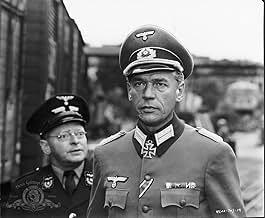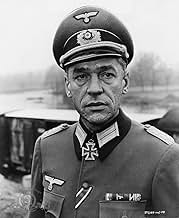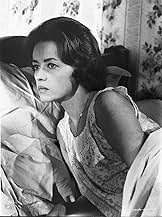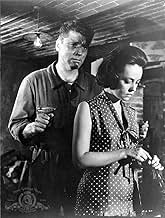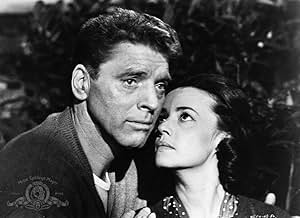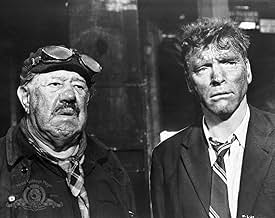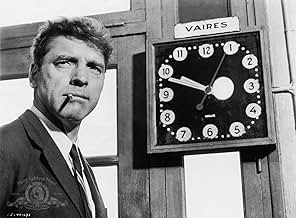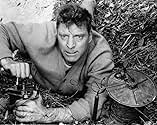En 1944, un coronel alemán carga un tren con tesoros de arte franceses para enviarlos a Alemania. La Resistencia debe detenerle sin dañar el cargamento.En 1944, un coronel alemán carga un tren con tesoros de arte franceses para enviarlos a Alemania. La Resistencia debe detenerle sin dañar el cargamento.En 1944, un coronel alemán carga un tren con tesoros de arte franceses para enviarlos a Alemania. La Resistencia debe detenerle sin dañar el cargamento.
- Dirección
- Guionistas
- Elenco
- Nominado a 1 premio Óscar
- 1 premio ganado y 3 nominaciones en total
- Didont
- (as Albert Remy)
- General Von Lubitz
- (as Richard Munch)
- Sergeant Schwartz
- (as Donal O'Brien)
- Pilzer
- (as Art Brauss)
- Major
- (as Jean-Claude Berco)
Opiniones destacadas
The film begins in Paris, August 2, 1944
It's 1511th day of German occupation The liberation of Paris seems very close
Nazi Colonel Von Waldheim (Paul Scofield) decides suddenly to remove by train to Germany the best of Impressionist masterpieces His objective is clear: "Money is a weapon. The contents are as negotiable as gold and more valuable."
Mademoiselle Villard (Suzanne Flon) informs the Resistance of the shipment The Resistance reaction is to stop the train without damaging the national heritage "They are part of France." But stopping the train is not a simple task You can get killed especially if you are French and the train is German
Labiche (Burt Lancaster), the Chief Inspector of the French Railway System, is not impressed However, he never communicates his political, ideological, or nationalistic convictions, "For certain things, we take the risk," he said; "but I won't waste lives on paintings."
When an aged engineer, Papa Boule (Michel Simon), is accused of sabotage in spite of saving the train through the Allied's bombs at the risk of his own life, Labiche is forced into combat
It begins with a long sequence where an armament train and the art train are both trying to leave the yard in the morning As they are being moved back and forth across the tracks, the viewer knows that British planes will hit the yard in that moment at exactly 10:00 o'clock
New complications are introduced, but the central conflict always returns to an obsessive art lover against a man with no appreciation for art Labiche's only concerns is to slow down the Nazis keeping himself and his compatriots alive
Now, two forces control the film The first is Frankenheimer's cleverness to choreograph the real trains Frankenheimer and his cinematographers capture the heat of the engines, the noise and sound of the cars in motion, the fault in the oil line, the crushing strength implicated when the machines come into collision and the derailment The second force is Lancaster, the "headache" of the fanatical obsessed Colonel whose desire is to see the priceless paintings in Nazi Germany...
Burt Lancaster stars as a French train engineer that has to transport the shipment. At first is not a easy task, but he succeeds in the end. Meanwhile he becomes friend with a hotel owner played by French actress Jeanne Moreau (that passed away last year). And the other members of the cast are fine. Paul Scofield as a German general is great (and Scofield also starred in other great movies after this), and it was a treat seeing French comedian Michel Simon in a war movie (just like Bourvil in THE LONGEST DAY).
This movie had great direction by John Frankenheimer, great performances by all the actors, and also great photography in Black and White. Although a bit dragged in some places, it was still great to watch! And as a fan of the history from 1850 until these days, I liked the movie for his accuracy and his action scenes.
John Frankenheimer directs in stark black and white, and the film has his trademarks all over it -- kinetic compositions, rapid-fire editing, ragged documentary look and feel. Paul Scofield also stars as the obsessed Nazi and Jeanne Moreau has a role as a French woman who reluctantly aids and abets Lancaster. The sheer physical production is astounding; in the days before CGI would have done everything for them, Frankenheimer and company staged massive set pieces involving bombed railroad yards, crashing trains, you name it. I can only imagine how much pressure the special effects guys were under to get everything right the first time because re-staging it for a second try would have been a bear.
"The Train" brought Franklin Coen and Frank Davis an Academy Award nomination for Best Original Story and Screenplay at the 1965 Oscars.
Grade: A-
Seeing 'The Train' two days ago, what instantly came to my mind after watching was "wow!" Like most people here, to me this was a pretty exceptional film that really packs a punch in a way that not many films of its year, decade or even genre at this point of film history did. Truly powerful work that took risks and pulls no punches in a way that still has the ability to shock, no trivialising or sugar-coating here. Quite the opposite. As far as WWII films go, it is one of the best and despite being highly praised deservedly more people should know about it, it is really quite something and unlike a lot of films personally seen.
Maybe 'The Train' runs a little too long by about 15 minutes or so, which occasionally (emphasis on that word) affects the pace.
On occasions too early on, for my tastes Maurice Jarre's music score jarred a bit and like it belonged more in a comedy.
Conversely, there are so many strengths (which is actually pretty much everything else) and everything else is executed flawlessly. 'The Train' is quite masterful visually, the photography is full of atmosphere and played a huge part in making the train itself like its own character. Have never seen a train so cleverly, intimately and powerfully used. The French locations are incredibly well utilised, some of the best use of French locations for any film seen in a long time from personal view. On a technical level, the action with the train is enough to make the jaw drop today. Frankenheimer's direction is hugely accomplished and not since 'The Big Parade' as far as recent film viewings go has there been direction for any film that was this visually flawless. Most of Jarre's score works very well, when it becomes more subtle and more harmonious with the atmosphere it is quite hauntingly unsettling.
Script is very intelligent and thought-provoking, taut enough while allowing breathing space yet not rambling. The story is hugely compelling, is very intense especially the exciting action with the train and is emotionally powerful. Found myself quite moved and shocked at how much the more uncompromising moments (and there are many) wrenched the gut, haven't seen an ending this poetic in a while either. The characters are well defined and interesting. There are great performances from all, with Lancaster superb in one of his best performances. He tells so much with his face and eyes and could tell he meant every word with his line delivery, he is especially good in the last twenty minutes where words are few but one intensely feels his hurt and anger. Scofield has seldom been nastier or at times even frightening. Jeanne Moreau's role isn't huge but she is sympathetic in it and an atypically cast Michel Simon is very telling in his.
In summary, exceptional and one of the best WWII films. 9/10
Argumento
¿Sabías que…?
- TriviaBurt Lancaster performed all his own stunts in this movie. Albert Rémy also got into the act by performing the stunt of uncoupling the engine from the paintings train on a real moving train.
- ErroresWhen the German officer in the train thinks they've arrived in Germany, he takes a look at his map and we see Strasbourg (Alsace, France), the France-Germany border and Baaden-Baaden (Germany). During German occupation of France, Alsace and Strasbourg were annexed to the German Reich, i.e. this German military map should have shown a different border (100 km West) and Strasbourg should have been in Germany.
- Citas
Colonel von Waldheim: Labiche! Here's your prize, Labiche. Some of the greatest paintings in the world. Does it please you, Labiche? Give you a sense of excitement in just being near them? A painting means as much to you as a string of pearls to an ape. You won by sheer luck: you stopped me without knowing what you were doing, or why. You are nothing, Labiche -- a lump of flesh. The paintings are mine; they always will be; beauty belongs to the man who can appreciate it! They will always belong to me or to a man like me. Now, this minute, you couldn't tell me why you did what you did.
- Créditos curiososOpening credits prologue: PARIS August 2-1944 1511th day of German occupation
- Versiones alternativasWhilst the official run time is 133 minutes, the BBFC website has two separate entries, one with a theatrical 'U' rated certificate in 1964 running at 141 minutes 31 seconds and the other entry with a theatrical 'A' rated certificate in 1959 running at 90 minutes 37 seconds. Though the second entry seems incorrect due to the erroneous date of certification being 21 October 1959 (the film was being made in 1963 and is copyrighted in 1964) and a much shorter run time, the BBFC reference numbering is in sequence with the later video rated entries so it is unknown if this 1959 entry is a much shorter cut of this film or this is an error in the BBFC records. It is also not known if the 142 minute entry is a longer cut of the film that has simply not been since it's UK theatrical release in 1964.
- ConexionesFeatured in Film Review: Burt Lancaster (1968)
Selecciones populares
- How long is The Train?Con tecnología de Alexa
Detalles
- Fecha de lanzamiento
- Países de origen
- Idiomas
- También se conoce como
- The Train
- Locaciones de filmación
- Acquigny, Eure, Francia(trains pile-up, 49°10'22.73"N, 1°10'44.84"E)
- Productoras
- Ver más créditos de la compañía en IMDbPro
Taquilla
- Presupuesto
- USD 6,700,000 (estimado)
- Tiempo de ejecución2 horas 13 minutos
- Color
- Relación de aspecto
- 1.66 : 1
Contribuir a esta página



